|
Feoh byþ frofur fira gehƿylcum; sceal ðeah manna gehƿylc miclun hyt dælan gif he ƿile for drihtne domes hleotan.
|
 |
Wealth is a benefit to everyone, yet every man shall deal it out greatly if he wishes Oden to intervene in his fate.
|
|
Ur byþ anmod ond oferhyrned, felafrecne deor, feohteþ mid hornum mære morstapa; þæt is modig wuht.
|

|
Ur is fierce and greatly horned, a very dangerous beast, it fights with horns, a great traveler of the moors that is a bold wight.
|
|
Ðorn byþ ðearle scearp; ðegna gehwylcum anfeng ys yfyl, ungemetum reþe manna gehwelcum, ðe him mid resteð.
|

|
The thorn is exceedingly sharp, an evil thing for which to grapple, immeasurably harsh for every man that within it rests.
|
|
Ós byþ ordfruma ælere spræce, wisdomes wraþu ond witena frofur and eorla gehwam eadnys ond tohiht.
|

|
Ós is the point of origin of all speech, wisdom's support and the wise man's help and for every noble joy and hope.
|
|
Rád byþ on recyde rinca gehwylcum sefte ond swiþhwæt, ðamðe sitteþ on ufan meare mægenheardum ofer milpaþas.
|

|
Rád is soft for the warrior in the hall, but very brisk for he that rides over miles of paths upon a hardy mare.
|
|
Cén byþ cwicera gehwam, cuþ on fyre blac ond beorhtlic, byrneþ oftust ðær hi æþelingas inne restaþ.
|

|
Cén is for the living known by its fire, flashing bright it burns, often where princes rest within.
|
|
Gyfu gumena byþ gleng and herenys, ƿraþu and ƿyrþscype and ƿræcna gehƿam ar and ætƿist, ðe byþ oþra leas.
|
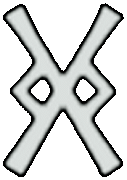
|
To gift is to bring one splendor and praise, support and worthiness; it furnishes help and subsistence to all broken men who are devoid of aught else.
|
|
Ƿenne brūceþ, þe can ƿēana lyt sāres and sorge and him sylfa hæf blǣd and blysse and eac byrga geniht.
|

|
Wenne is had by he that knows little want, suffering or sorrow and he that has prosperity and bliss, and a well defended home.
|
|
Hægl byþ hwitust corna; hwyrft hit of heofones lyfte, wealcaþ hit windes scura; weorþeþ hit to wætere syððan.
|
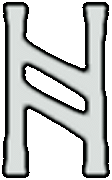
|
Hægl is the whitest corn it whirls from the heaven's sky, showers of wind toss it, then it becomes water.
|
|
Nyd byþ nearu on breostan; weorþeþ hi þeah oft niþa bearnum to helpe and to hæle gehwæþre, gif hi his hlystaþ æror.
|
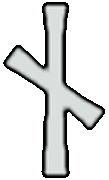
|
Nyd is heavy on the heart, though it often turns into the salvation and help of children of men if they heed to it soon.
|
|
Ís byþ ofereald, ungemetum slidor, glisnaþ glæshluttur gimmum gelicust, flor forste geworuht, fæger ansyne.
|
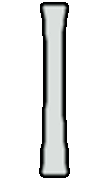
|
Ís is extremely cold immeasurably slippery, it glistens bright as glass, and shines like a gem, a floor wrought of frost is fair to see.
|
|
Gér byÞ gumena hiht, ðonne God læteþ, halig heofones cyning, hrusan syllan beorhte bleda beornum ond ðearfum.
|
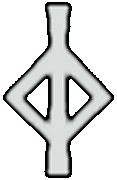
|
Gér is man's hope when God, holy heaven's king, lets the earth bring forth bright fruits to the rich and the poor alike.
|
|
Éoh byþ utan unsmeþe treow, heard hrusan fæst, hyrde fyres, wyrtrumun underwreþyd, wyn on eþle.
|
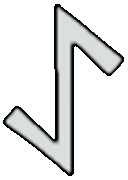
|
Éoh is on the outside an unsmooth tree, held hard and fast in the earth, it is the fire's guardian, its roots wreathed under it, it is a joy upon an estate.
|
|
PeorÞ byþ symble plega and hlehter wlancum, on middum, ðar wigan sittaþ on beorsele bliþe ætsomne.
|

|
PeorÞ dwells in the festival playing and boastful laughing, in the middle, of that place where warriors sit happily in the beerhall.
|
|
Secg eard hæfþ oftust on fenne ƿexeð on ƿature, ƿundaþ grimme blode breneð beorna gehƿylcne ðe him ænigne onfeng gedeþ.
|
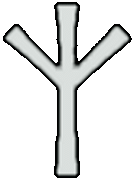
|
The warrior often has homeland at the fens growing in water, wounds and rages every hot blooded man everyone a duty to do.
|
|
Sigel semannum symble biþ on hihte, ðonne hi hine feriaþ ofer fisces beþ, oþ hi brimhengest bringeþ to lande.
|
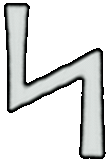
|
Sigel is always hoped for by seafarers, when they travel over the fish's bath till the horse of the waves brings them to land.
|
|
Tír biþ tacna sum, healdeð trywa wel wiþ æþelingas; a biþ on færylde ofer nihta genipu, næfre swiceþ.
|
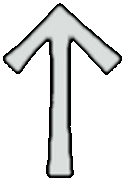
|
Tír is a token that holds pledges well with nobilty, it is always on course over the mists of night and it never betrays.
|
|
Beorc byþ bleda leas, bereþ efne swa ðeah tanas butan tudder, biþ on telgum wlitig, heah on helme hrysted fægere, geloden leafum, lyfte getenge.
|

|
Berkana bears no fruit, yet without seed it brings forth suckers, for it is generated from its leaves. Splendid are its branches and gloriously adorned its lofty crown which reaches to the skies.
|
|
Eh byþ for eorlum æþelinga wyn, hors hofum wlanc, ðær him hæleþ ymb[e] welege on wicgum wrixlaþ spræce and biþ unstyllum æfre frofur.
|
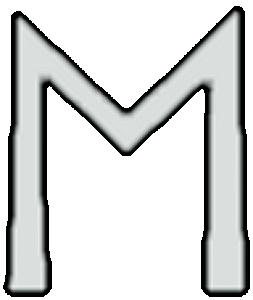
|
Eh is for earls, a prince's glory in the presence of warriors. A horse's hooves are proud when heroes are about it, the wealthy on war steeds converse, it is always a source of comfort to the restless.
|
|
Mann byþ on myrgþe his magan leof: sceal þeah anra gehwylc oðrum swican, forðum drihten wyle dome sine þæt earme flæsc eorþan betæcan.
|
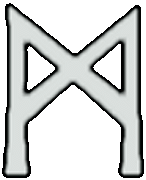
|
Mann of mirth is to his kinsmen dear, though they each shall betray the other when the drighten in his judgement commits his poor flesh to the earth.
|
|
Lagu byþ leodum langsum geþuht, gif hi sculun neþan on nacan tealtum and hi sæyþa swyþe bregaþ and se brimhengest bridles ne gymeð.
|

|
Lagu is to people thought infinite, if they shall venture forth on a shaky ship and the sea waves strongly frighten and the horse of the waves heeds not its bridles.
|
|
Ing wæs ærest mid est Denum gesewen secgun, oþ he siððan eft ofer wæg gewat; wæn æfter ran; ðus Heardingas ðone hæle nemdun.
|
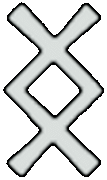
|
Ing was first seen by men among the Danes of the east, till he went back over the wet way and his chariot ran after him. So the Heardingas named the hero.
|
|
Éþel byþ oferleof æghwylcum men, gif he mot ðær rihtes and gerysena on brucan on bolde bleadum oftast.
|
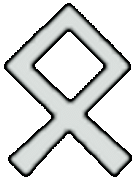
|
Éþel is very dear to every man, it is right and proper that he has opportunity to enjoy makeing his home there, prosperity shall remain.
|
|
Dæg byþ drihtnes sond, deore mannum, mære metodes leoht, myrgþ and tohiht eadgum and earmum, eallum brice.
|
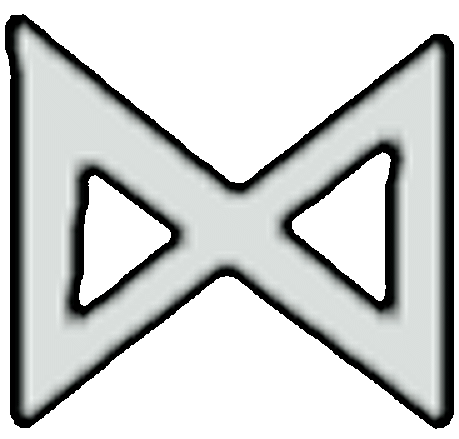
|
Dæg is the drighten's messenger, dear to men, the measurer's shining light, mirth and hope to rich and poor, and for all to enjoy.
|
|
Ác byþ on eorþan elda bearnum flæsces fodor, fereþ gelome ofer ganotes bæþ; garsecg fandaþ hwæþer ac hæbbe æþele treowe.
|

|
The oak fattens the flesh of pigs for the children of men. Often it traverses the gannet's bath, and the ocean proves whether the oak keeps faith in it’s noble troth
|
|
Æsc biþ oferheah, eldum dyre stiþ on staþule, stede rihte hylt, ðeah him feohtan on firas monige.
|

|
Æsc is exceedingly tall and precious to men, firm in its foundation, it offers a strong resistance, and fights off many men.
|
|
Ýr byþ æþelinga and eorla gehwæs wyn and wyrþmynd, byþ on wicge fæger, fæstlic on færelde, fyrdgeatewa sum.
|

|
Ýr is to princes and earls alike a joy and honour, it is on a war steed fair, and it is steadfast war gear on a trip.
|
|
Iar byþ eafix and ðeah a bruceþ fodres on foldan, hafaþ fægerne eard wætre beworpen, ðær he wynnum leofaþ.
|
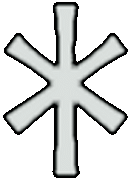
|
Ior is a river fish and though it always feeds on land, it has a lovely home, surrounded by water, where it lives in happiness.
|
|
Éar byþ egle eorla gehƿylcun, ðonne fæstlice flæsc onginneþ, hraƿ colian, hrusan ceosan blac to gebeddan; bleda gedreosaþ, ƿynna geƿitaþ, ƿera gesƿicaþ.
|
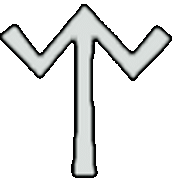
|
Éar is loathsome to every earl, when the flesh begins to quickly cool, and the body is put to bed in the dark earth. Prosperity declines, joy departs, and oaths are broken.
|